Whilst several approaches have been undertaken to improve water, sanitation and hygiene (WASH) services, very little work has been carried out and documented on water and sanitation competitions. The use of WASH competitions is one of the effective and low cost approaches to improving WASH services both in schools and surrounding communities. This paper is based on practical experience from the recently conducted WASH competition in 52 targeted schools in Gulu, Kitgum, Lamwo and Pader of Northern Uganda.
Introduction
Northern Uganda, where Gulu, Kitgum, Lamwo and Pader are located is
rebounding after 20 years of insurgency and civil war. With the return of peace,
communities are rebuilding and embracing opportunities for growth and
development. In regard to sanitation the rebuilding commenced with basic WASH
facilities including pit latrines, rain water harvesting tanks (RWHTs), and
drilling of Bore holes (BHs). A number of Non-Governmental Organizations (NGOs)
and the government of Uganda provided a number of WASH facilities to the
affected communities of Northern Uganda during the insurgency. However, the
operation and maintenance (O&M) of these facilities is very poor with a
number of bore holes non-functional, rain water harvesting tanks missing taps
and gutters both in schools and communities and latrines missing doors for
privacy, dirty with urine on the floor and open defecation surrounding the
latrines (Namata 2015, MWE 2013). Most of the established School Health Clubs
were not functional and some were completely dissolved (MWE 2011). The WASH activities were either not
prioritized or not completely included in school development plans and budgets,
which undermined all efforts by School Health Clubs to promote WASH activities. A School Health Club is a school management
sub-committee that oversees health aspects for better health in the school.
WASH
competition is one of the innovative approaches that can be used to promote
best sanitation and hygiene practices as well as ensuring sustainable O&M
of WASH services. It encourages competitors to work hard by improving areas
agreed upon. WASH competitions in schools are done with the hope that
pupils understand how this can contribute to a better and healthier lifestyle
both at school and at home but more importantly apply it to their everyday
lives (Sputnik 2015). Targeted schools must ensure that the school health clubs
are functioning and remain active. The competition is linked to the
implementation of the school health club action plans which are built on three
principles namely teachers, students and school management being engaged and
supporting the functioning of the clubs and school WASH facilities; clubs
engaging the entire school community for maximum coverage and impact; and clubs
demonstrating change in key issues related to WASH.
WASH competitions can be
organized for the targeted schools and communities after implementing a number
of WASH activities such as awareness creation, trainings, construction works
and training in operation and maintenance of WASH facilities.
There different categories/forms
of competition for example poem writing best for grades 1 to 3 students
(between 6-8 years), poster creation category good for grade 4 to 6 (9-11
years), essay writing category for form 1 and 2 students (between 13-16 years
old), Folk song/Original composition and drama best for the school health club
to pass on promotional WASH messages. The competition can be in form of
proposal writing and the best can be funded for implementation and or marks
awarded basing on day today O&M of WASH facilities. So depending on the
time frame and what pressing need and expected participants, the organizers can
decide on the different forms of competition.
In a bid to improve the operation
and maintenance of the facilities therefore, Amref organized WASH competitions
for the 52 targeted schools in Gulu, Kitgum, Lamwo and Pader. The WASH competition came after an intense but fascinating
implementation of a number of WASH activities including construction of pour
flush toilets, drainable Ventilated Improved Pit Latrines (VIP), construction
of ferro cement tanks in all targeted schools, formation and training of school
health clubs, school management committees in operation and maintenance of WASH
facilities.
Preparatory stage
Planning meetings
All targeted schools in the four districts were engaged in planning
meetings to agree on the theme and criterion to guide the competition. Basing
on the poor O&M of WASH facilities in schools, the theme “Sustainable
Operation and Maintenance of all WASH facilities for good health and
development” was
chosen to guide the competition. Other criterion included all participating
schools to fix non-functional WASH facilities, having active school health clubs
with the goal to promote good health and hygiene practices in schools
in order to create a positive environment for behavior change, particularly
amongst learners and school staff and subsequently the surrounding communities.
Judging of the two forms of competition (the facilities and creative
elements-poem and folk song) is done separately by different people with
different skills). A panel of five judges from the Ministry of Education,
Ministry of Health with experience in Music, Dance and Drama (MDD) were
identified to judge the creative element of the competition. A school hygiene
and sanitation monitoring tool was also developed to be used in targeted
schools. The District Education Officers (DEOs), Inspectors of schools, Health
Inspectors, Project staff are potential users of this form and each school is
awarded marks basing on the O&M of their WASH facilities. For a school to
get good marks, its WASH facilities (RWHT, latrines, Borehole, Hand washing
facilities) must be functional and well maintained.
Possible prizes were thought of to be won by good performing schools
and outstanding students. Among the prizes were; A trophy for the best
performing school, hand washing facilities, stainless tanks (250 litres for
storage of drinking water), jerry cans, basins, T-shirts with WASH promotional
messages and plates and cups. It was during the planning meetings that
participants grouped the prizes to be won by the overall winning school, second
and third performing school and the outstanding students. In this case, the
overall winner was meant to walk away with a trophy, a 250 litres stainless
tank and a bull. The second run up to walk away with a 250 litres stainless
tank and a goat while outstanding students and their teachers to receive
t-shirts, jerry cans or basins.
Methodology
52 targeted schools were
purposively selected to participate in the competition. The competitions were
based on the theme “Sustainable Operation and Maintenance of all WASH facilities
for good health and development”. Onsite school WASH assessment
(through direct observation on the status of latrines, functionality of Rain
Water Harvesting Tanks (RWHTs), Bore holes (BH)s, general cleanliness of the
school compound and classes were carried out on a monthly basis for a period of
6 months. General performance by members of School Health Clubs (SHCs) through
music, dance and drama were also used to pass on information and marks were
awarded accordingly.
Implementation stage
School management committees
actively participated by mobilizing resources from parents and fixed
non-functional facilities. Facilities fixed included; the rain water harvesting
tanks fixed with gutters and missing taps, boreholes fixed and fenced off.
School health club members together with their patrons and teachers in charge
of MDD were very instrumental in composing poems and folk songs full of WASH
promotional messages, making presentations and marks awarded accordingly by a
panel of judges.
The DEO and Inspectors of schools
have been very responsive and positive towards the competition. They actively
participated in the assessment and monitoring of school WASH activities. The
whole exercise turned a very successful educational and awareness competition.
Results
Vanguard Primary school in Gulu Municipality emerged the overall winner
with 192 marks (92 being scored in the day today O&M of their WASH
facilities) followed by Pece primary school with 189 marks. In Kitgum Town
Council, Kitgum Prison Primary emerged the best, while Mad Kloch being the best
performing school in Agago District. All the best performing schools and
outstanding students were awarded with different categories of prizes ranging
from a trophy, stainless tanks for storage of drinking water, t-shirts, jerry
cans, basins and plates and cups.
School health clubs (52) have
been strengthened and actively promoting WASH best practices in schools and in
surrounding communities through health parades, music, dance and drama and
through radio talk shows. This has led to improvement in personal hygiene of
pupils with 89% of the total (enrolment) pupils washing hands with water and
soap especially after toilet use. Improvement in terms of hand washing was
measured by the presence of hand washing facilities, availability of water and
soap and through progress reports from targeted school. This paper is a follow
up of the findings from selected schools in Northern Uganda presented in a
paper entitled “Achieving sustainable O&M of WASH facilities that indicated
that thirty-two percent (32%) of the
visited schools had hand washing facilities close to the toilet facilities but
only 9% of these had water for hand washing and only 4% had soap. Shortage of
water, absence of hand washing facilities and low awareness on the importance
of hand washing was cited as major factors hindering majority of schools from
practicing hand washing. This was the basis for putting more emphasis on hand
washing leading to 85% of the targeted schools fixing their hand washing
facilities, filling them with water and soap and reminding students to wash
their hands especially after toilet and before eating.
School management committees
(SMCs) (52) strengthened and are more involved in school WASH activities
especially through encouraging parents to contribute to operation and
maintenance fund for WASH facilities (UGX 1000/= per head/pupil), inspecting
use of WASH facilities. As a result, broken doors have been fixed and thirty-eight
(38) rain water harvesting tanks have been re-fixed with missing gutters and
taps. As a result, schools are able to harvest and store enough water for
general cleaning and cooking. This has also resulted into increased hand
washing by pupils due to the availability of water.
Additional WASH facilities for
example 55 hand washing facilities, wash rooms constructed and renovation of
existing latrines done using the O&M fund created by active SMCs. This has
led to reduced pupil stance ratios from 90:1 to 40:1 & 50:1 in most of the
targeted schools. Pupil stance ratio refers to the number of pupils in the
school divided by the total number of latrine stances in the school. Detergents
(soap, toilet papers) are being bought for cleaning of latrines.
In addition, schools with active
SMCs 49 out of the 52 (91%) targeted schools have recruited caretakers to
ensure good operation and maintenance of WASH facilities. As a result, there is
general cleanliness of the toilets throughout the day, no breakage of latrine
doors or piercing of hand washing facilities by pupils as the care taker also
acts as watch dogs for these facilities. Piercing of hand washing facilities is
where by students use sharp objects like nails, stones, needles to open a hole
in the hand facility.
A total of 22 out of 28 (79%)
boreholes within/surrounding the targeted schools have been fenced off. This
has improved on the general cleanliness of the boreholes surroundings as well
as ensuring good operation and maintenance of the facility.
Targeted schools 45 out of 52
have turned into exchange learning centers. For example, Vanguard P/S in Gulu
and Kitgum Prison School hosting ministers from Southern Sudan, SMCs/PTAs from
other schools and Local leaders for learning purposes. Pece Primary School and
Vanguard Primary School have hosted Kawempe Division local leaders including
councilors and technical staff for a learning visit on the good O&M of
their WASH facilities.
There is reported increase in the
school enrollment across all the targeted schools for example Kitgum Prison
Primary School enrollment has increased from 731 by 2013 to 990 (with 521
girls) as of June 2015. This is partly due to improved sanitation facilities in
the school that has encouraged children especially the girls stay in school
during their menstrual periods. The focus group discussion meetings held with
girls and senior women teachers revealed this.
Lessons Learnt/Recommendations
· Greater impacts of school WASH is realized and sustained when the
activities target both schools and surrounding communities and this facilitates
cost sharing with key stakeholders including partners.
·Early engagement of all stakeholders makes decisions faster and smoother
thus activity implementation is much easier.
Conclusion
Onsite school WASH assessment
which is phase one of the WASH competition greatly influences SMCs/PTAs and
teachers to improve on operation and maintenance of the water and sanitation
facilities to earn better marks while phase two of general presentations
promotes more of behavior change to a wider coverage. Based on the above, WASH
competition approach should be used to promote sustainable WASH services







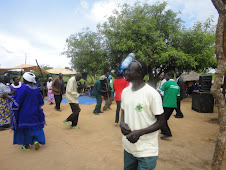









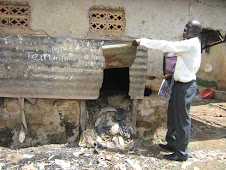






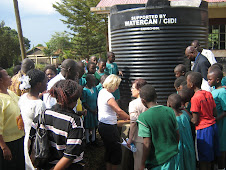

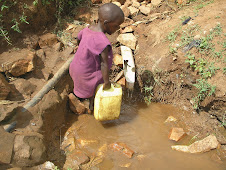











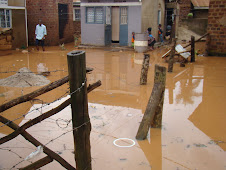




No comments:
Post a Comment